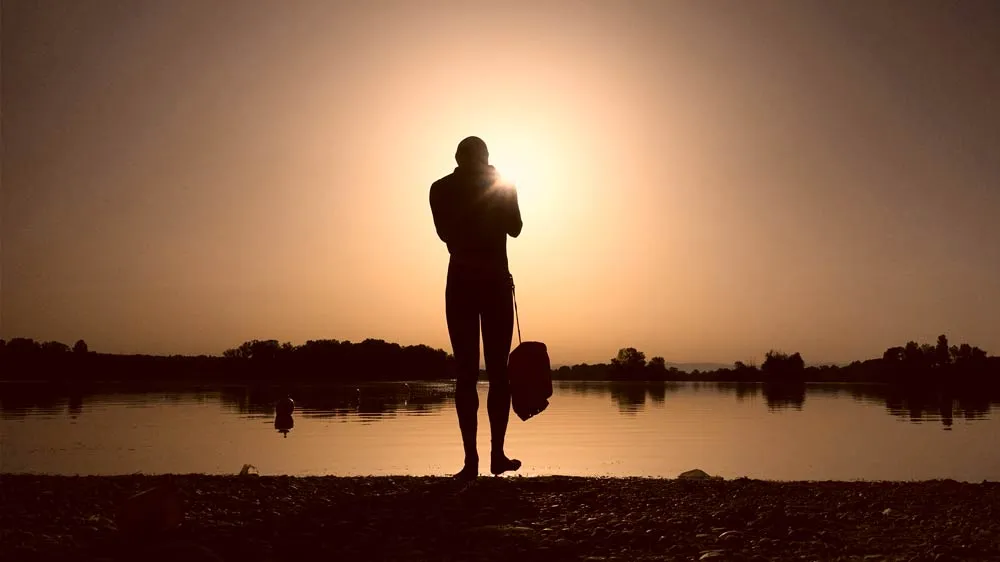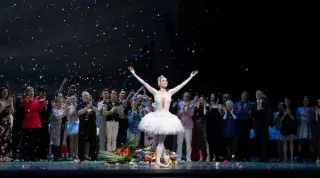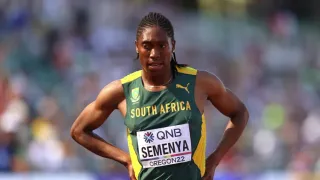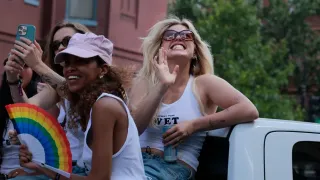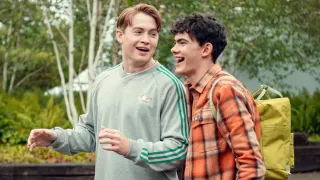December 5, 2017
Science Meets Broadway in Upcoming Lung Cancer Cabaret Benefit
John Amodeo READ TIME: 7 MIN.
Ten years ago, Hildy Grossman, a Boston-area cabaret singer and lung cancer survivor, wanted to contribute meaningfully to the fight against lung cancer. And she did -- the only way she knew how -- with song. To make it happen, she founded the non-profit organization Upstage Lung Cancer (ULC) through which she would produce various entertainment events where the proceeds would go to cancer research, with a special focus on early detection. This year, ULC presents its 9th Annual Cabaret Benefit "From Bench to Broadway: Music Where the Science Is," on Thursday, December 7, at MIT's Koch Institute for Integrative Cancer Research.
The vibrant Broadway-based program includes selections from such contemporary musicals as "Wicked," "Into the Woods," "Dear Evan Hansen," "Jekyll & Hyde," and "Chicago," as well as some classics of the Great White Way as "Cinderella," "Showboat," and "Music Man" featuring solos, duets, and full ensemble numbers.
This year's cast includes the award-winning cabaret performer Brian De Lorenzo (full disclosure, De Lorenzo is this writer's husband) a veteran performer of all nine annual ULC benefits; Grossman; actor/director Michael Hammond; singer/actress Paula Markowicz, another ULC veteran performer; and singer/radio show host Candy O'Terry, with guest singer Sheree Dunwell. Emmy Award-winning Arts & Entertainment Critic Joyce Kulhawik will emcee, as she has done for all prior ULC benefits, and Tim Evans music-directs.
EDGE spoke with three of the people behind this year's production, all highly accomplished women, each of whom is actively engaged in the fight against cancer, and for whom cancer has irrevocably changed their lives.
First, we spoke with Anne Deconinck, Executive Director of the Koch Institute for Integrative Cancer Research
EDGE: What does it mean to the Koch Institute and you personally to host this event?
Anne Deconinck: We are a national cancer research center, but we aren't a clinic: we don't have patients or a hospital. We don't have that many opportunities to interact with patients. It is inspiring as well as enlightening to see patients fighting their fight and to hear their stories of perseverance and courage, so that we can become patient advocates. This event is an opportunity to interact. Also, the Koch Institute will be a partial beneficiary. Most grant money prescribes how we can use it. Using the discretionary funding that comes with this donation, our faculty can act freely on their early ideas so they can develop their initial thoughts about research That's how you drive innovation and help people take some risks. That's how you impact and save people's lives. We can apply outside-the-box thinking.
EDGE: What distinguishes the Koch Institute from the many other local cancer research centers?
Anne Deconinck: In 1971, when Nixon declared the war on cancer, and designated national cancer centers, MIT threw its hat in the ring, and it was one of only seven institutes who got this national cancer research designation. After a very rich history over the first 30 years, five faculty receiving Nobel prizes, MIT had some of the biggest names in revolutionary approaches. The MIT culture of open labs and collaboration means nothing is impossible. You just have to find the right collaborator. We are all working toward the same goal, to bring our ideas and hard work to improve the lives of cancer patients. The people around me work not for personal fame, but for the good of people with cancer, and it makes me feel proud to be a part of it.
EDGE: How is hosting a musical event different from your other fund-raising efforts?
Anne Deconinck: By hosting, we invite people to the Koch Institute, and raise awareness to our program. Public engagement is important to promote our research. We can't do this without public support. Having people come to this musical event helps us do what we do. The passion Hildy and the cast of performers bring to what they do is the same passion we bring to our work. We share the same passion whether on stage or at the bench, to improve the lives of others. It's expressed differently, but the passion is the same.
Next, we spoke with Candy O'Terry, the 25-year host of the radio program "Exceptional Women" on Magic 106.7. She is also the President of "Boston Women in Media and Entertainment," of which Grossman is also a member. Grossman has been eager to get O'Terry involved with ULC and this was the year it could happen.
EDGE: What brought you to be the radio spokesperson for the American Cancer Society's 'Making Strides Against Breast Cancer Walk' for 13 years?
Candy O'Terry I was on Magic 106.7 for 25 years, and began very early on at Magic being a voice for daughters of women whose mothers died of breast cancer. My own mother died of breast cancer. Once a young woman loses her mother, she becomes part of the club of daughters without mothers. I was an only child who lost her mother early on. And as a radio host, I talked to a lot of members of that club, and I decided that becoming part of '...Strides' was a way I could contribute. Also, I support EmpoweringHer.org, which offers mentoring for young girls and women who have lost their moms to breast cancer. I think that local grass-roots organizations like ULC are so important. It feels a lot more genuine and real, rather than putting your check in an envelope and sending it far away.
EDGE: You are also a singer. What songs will you be singing at this benefit?
Candy O'Terry I am so excited about this performance. The first song will be 'Over the Rainbow,' which I performed with the Boston Pops ten years ago. This song is on my CD 'Dream Come True.' The second song is 'For Good' ('Wicked'). I'm fortunate to be singing this with Sheree Dunwell, the grand champion of Emmy-Award winning program 'Community Auditions: Star of the Day' the same year I was part of the cast. We are also recording this song, and I am petitioning Stephen Schwartz to allow us to use this song to benefit Upstage Lung Cancer with 100 percent of the proceeds going to ULC.
EDGE: Why do you think it is important to be a part of this event?
Candy O'Terry I'll tell you what. I'm a huge believer in karma. My goal is to throw good things out into the world in the hope that they will come back to me. I'm so happy to be a part of this, I really am.
Lastly, we spoke with our very own Joyce Kulhawik, president of the Boston Theater Critics Association.
EDGE: I believe you have hosted each of the nine annual ULC benefits.
Joyce Kulhawik: Which means I can't repeat anything I've worn (laughs). I jumped on board right away with Hildy. She has grown this event, created a whole foundation and raised so much money. I'm just happy to be part of something like this that has real results. Lung cancer is still so prevalent, and still so stigmatized. We need to destigmatize lung cancer and all cancers. Talking about them is the best way to go.
EDGE: You are a three-time cancer survivor.
Joyce Kulhawik: Yes. I've had two cancers three times. In 1979 I had malignant melanoma, which is the most vicious and aggressive form of skin cancer and one of the most incurable, though in the last two years they have come up with therapies that actually work.
Then ten years later, ovarian cancer; hard to detect. Mine was misdiagnosed every time. I kept insisting each time that the symptoms were of cancer. Then it came back. I am lucky that it was early detection. I must be here for a reason, and fighting cancer is part of that. There are many types, and any research for any cancer benefits all. It's so funny. I addressed Congress on the 20th Anniversary of the American Cancer Act. I appeared with Mary Wells and Jack Klugman, both of whom passed away from lung cancer. We all addressed the needs for funds for a cure. We then targeted the millennium for when we would have this licked, and yet we still have a long way to go. But we are gathering momentum, and this event is a step toward that end. Medicine is both an art and a science. And art also involves science. Some of the greatest artists, like Leonardo Da Vinci, were also scientists. You need places like MIT that has permeable boundaries to let in all perspectives -- free association to find solutions that are more than the sums of their parts. All of our knowledge is important. Nothings goes to waste. We all do what we can do. Some people look at test tubes, and some people sing and dance and put on a show. Everyone's contributions matter.
Upstage Lung Cancer presents "From Bench to Broadway: Music Where the Science Is" on Thursday, December 7; 6 p.m. Silent Auction, 7:30 p.m. show at MIT's Koch Institute for Integrative Cancer Research, 500 Main Street, Cambridge, ($10 Parking). Tickets: General Admission $45. Discounts available for students and lung cancer patients. VIP tickets: $100-$500. For reservations, visit this website.
John Amodeo is a free lance writer living in the Boston streetcar suburb of Dorchester with his husband of 23 years. He has covered cabaret for Bay Windows and Theatermania.com, and is the Boston correspondent for Cabaret Scenes Magazine.
